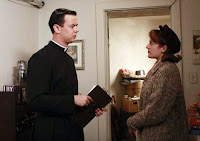The stories we find in the first two books of the Bible are dynamic. Genesis and Exodus are both filled with cinematic moments that have been captured to varying degrees.
These two narrative books are followed by Leviticus.
Now there is really know narrative in Leviticus, rather this book outlines priestly and holy living...in great detail.
There's much to do with offerings (sin offerings, burnt offerings) for the removal of sins, and laws concerning cleanliness, clean and unclean animals, sexual conduct, idolatry, rules for feast, and so forth.
Now, there is little that could probably make for a "Leviticus" film per se (although a film taking place with a priest, one of the sons of Aaron perhaps) could be interesting with some creative work and cultural research.
At the same time, Priest have played a huge role in as characters (real and fictional) in stories and films.
Priest: My Gripe
I could go far back into many of the distant examples of priest in film/tv (such as a recent favorite, such of mine I Confess.)
I do not come from a Catholic tradition, but all the same, I find it offensive that films usually present two sterotypical priest.
 Stereotype #1: sleazy pervert priest. As a recent example see Phillip Seymour Hoffman's character in Doubt (pictured right).
Stereotype #1: sleazy pervert priest. As a recent example see Phillip Seymour Hoffman's character in Doubt (pictured right).Now it's not completely outlandish that this stereotype would exist. Recent news stories over the years certainly make this one of the important events of our time. So I don't criticize Doubt or Bad Education dealing with these themes. But it just seems like these spiritual leaders are often portrayed as "up to no good."
In fact, I think an interesting take on the topic doesn't involve pedophilia, but sexual integrity of priest in general that we see in Carlos Carera's film El Crimen del Padre Amaro. This is the type of film that explores the issue, without just giving you a creepy feeling. Otherwise, these other films, just leave you disgusted.
 Stereotype #2: the saccharine priest. Keeping the focus on recent examples I think of the priest from the film Gran Torino, Father Janovich who continues to Clint Eastwood character Walt Kawalski trying to get him to confess his sins at the request of his wife.
Stereotype #2: the saccharine priest. Keeping the focus on recent examples I think of the priest from the film Gran Torino, Father Janovich who continues to Clint Eastwood character Walt Kawalski trying to get him to confess his sins at the request of his wife.Another character who seemed identical was Colin Hanks character in the TV series Mad Men (pictured right). Super sweet and caring, but some how just a little too caring. Enough so that it's almost annoying.
A Hope
I think a hope of mine would be that films and television shows could have characters that have religious convictions, even religious vocations without being so extreme on the spectrum. I would love to see someone's religious devotion be a characteristic of their personality that while impacting who they are, doesn't serve as a plot device because we are shocked by their fall or seen how other characters respond to their deepest devotion.
I know the reason stereotypes in art exist is to create easy ways to identify and build character development, but you can hope, right?
As for a film based purely off of Leviticus...can't say I see what that would look like, or have any recommendation for transforming the text of this into any direct one-to-one story.

2 comments:
I think a hope of mine would be that films and television shows could have characters that have religious convictions, even religious vocations without being so extreme on the spectrum.
Agreed. It would also be nice to see religious protagonists who aren't of the clergy but simply try to be faithful to their beliefs. Andrew Klavan seems to be trying to do this in Empire of Lies and the Homelanders series.
Religion is part of everyday life, yet it is constantly shown in extremes on the screen.
Perhaps it needs to not have attention called to it in order for it to not be so judged.
However Hollywood loves stereotypes, without them how would we know what to think?
Post a Comment